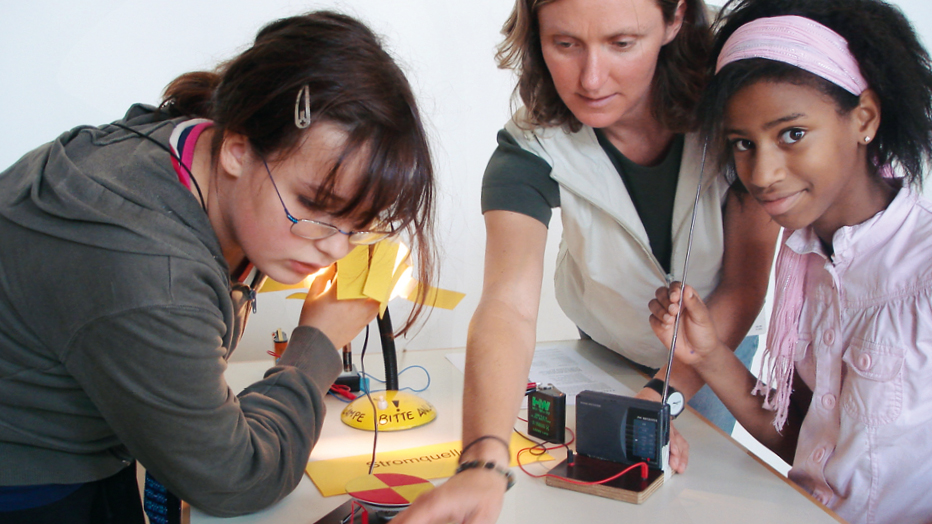Project Profile
Project Title: „School year of Sustainability“
Subject Cluster: Education
Project Objectives: Children in Frankfurt learn what sustainability means. They can suggest options for action and use these to structure their lives. Education for sustainable development to be a fixed feature in Frankfurt’s primary schools.
Project Start: 2012
Project Participants: The Environmental Office (Green City), the State Education Office Frankfurt, Umweltlernen in Frankfurt e. V., FES GmbH, Mainova AG (in the pilot phase), ABG Frankfurt Holding, Energy Department Frankfurt (since 2013)
Project Implementation: Umweltlernen in Frankfurt e.V.
Contact: Mareike Beiersdorf , Umweltlernen in Frankfurt e.V.
Why does the sea level rise when the ice at the South Pole melts? Where does the cocoa in chocolate come from? What happens to the waste in the garbage cans? Education which makes children familiar with sustainable development is also education directed at tomorrow’s adults.
The „School year of Sustainability“ project originated during Frankfurt’s candidacy for European Green Capital in 2012, being conceived as a lighthouse project for the educational sector and is directed at fourth grade primary school pupils. The aim: at the end of primary school, every child in Frankfurt should know what sustainable development means and which options are open for their own actions.
Children learn the impact of their own behaviourt
During the “School year of Sustainability“ several learning units, excursions and project weeks examined, as practically as possible, sustainability themes The programme starts with climate change, since the global impact of local action is particularly clear. Modules were designed on electricity, heat, wind energy, recycling, mobility, climate-friendly nutrition, fair trade, forests and energy. These are not treated as separate topics but are linked under the general aim of sustainable development and with the contents of the framework plans.
In all the modules, the children learn in a combination of talks and class discussions, they work in small groups with interactive games and practical experiments at learn stations.
Global, local, environment, economy, present and future: the overriding principle is networked learning. The children develop a feel for how their behaviour affects the environment and society and also that it can be of long-term significance. They are shown how to change entrenched habits and to act differently.
Anchoring Education for Sustainable Development in schools
When the new Education Act came into force in Hessen at the start of the school year 2011/2012, schools had to implement the new educational standards in their curricula. This offered the opportunity to integrate themes from Education for Sustainable Development into the school profiles.
The “School Year of Sustainability“ was developed by the Umweltlernen in Frankfurt e.V. which is also charged with its implementation in a four-year educational partnership with Frankfurt’s primary schools.
In the first two years, the schools choose six modules in the fields of climate, energy, recycling, fair trade, nutrition and mobility, a total of 20 lessons. Lasting between two and four hours, the modules can be organised by the schools themselves with their own focal points. The modules “Climate”- and “Sustainability“ are obligatory.
Class teachers ensure links to regular lessons with preparatory work and follow-up. They receive materials to deepen the subject matter and can take further training courses.
From the second year, the school chooses one theme from the modules for in-depth study and carries out a student project– such as taking part in the solar race competition or an energy-saving project. In the third and fourth year, the schools work on establishing sustainable development themes as a fixed part of the school curriculum. The Umweltlernen in Frankfurt e.V. advises and offers the teaching staff further training.
Excellent response to the Educational Programme
The fourth grade classes of ten primary schools are now participating in the „School year of Sustainability“ which will be extended, wherever possible, to all Frankfurt‘s primary schools.
Companies in Frankfurt are supporting the programme financially and in terms of content and this educational sponsorship will be extended to other companies.
The principle behind the “School year of Sustainability“ is still being developed as a pilot project for other age groups. Initial experience has already been gained with the “sustainability“ project week, in which all the eighth graders examined climate and energy, nutrition, clothing and ecological footprint. The project week is conducted in cooperation with the “Bildungswerk” of the Youth and Social Office.

Shaping lives
Teaching primary school pupils sustainability themes realistically; children learn how their behaviour affects the environment and society in general and how they can change their habits; children as multipliers.

Making learning attractive
Modules on a variety of sustainability themes; networked learning with a versatile combination of methods; training and guidance for schools; integrating Education for Sustainable Development into school curricula.

A broader base
Plans to extend the programme to all Frankfurt‘s primary schools and other age groups; introducing programme in other communities in Hessen recognised as official project of the UN Decade.
Umweltlernen in Frankfurt e. V.
Mareike Beiersdorf
Tel +49 (0)69 212-30130
mareike.beiersdorf(at)stadt-frankfurt.de


